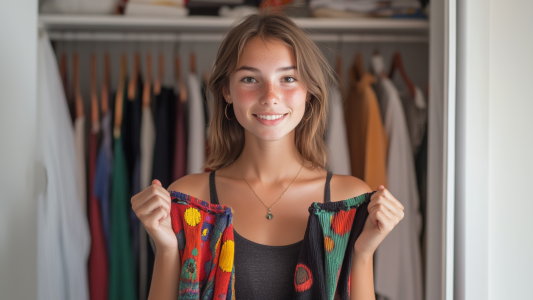A1.21.3 Spanish short story: The outfit of the day
We learn about clothing vocabulary. Ana chooses the clothes for the day.
Cuento corto: La ropa del día
Aprendemos sobre el vocabulario de la ropa. Ana elige la ropa del día.

A1 Spanish
Level: A1
Module 3: Día a día (Day to day)
Lesson 21: Ropa (Clothing)
Teaching guidelines +/- 15 minutes
Audio and video
Text and translation
| 1. | Ana suele eligir la ropa por la mañana. | Ana usually chooses the clothes in the morning. |
| 2. | Se pone una camiseta porque hace calor. | She puts on a T-shirt because it's hot. |
| 3. | También quiere llevar un jersey para la noche. | She also wants to take a jumper for the evening. |
| 4. | Se quiere poner unos vaqueros. | She wants to put on some jeans. |
| 5. | Debe llevar un cinturón para los vaqueros. | She should wear a belt with the jeans. |
| 6. | Quiere llevar unas zapatillas en lugar de zapatos. | She wants to wear some trainers instead of shoes. |
| 7. | Si llueve, ella lleva unas botas. | If it rains, she wears boots. |
| 8. | Si hay nieve, lleva un gorro y unos guantes. | If there's snow, she wears a hat and gloves. |
| 9. | También suele llevar una bufanda cuando hace frío. | She also usually wears a scarf when it's cold. |
Exercise 1: Discussion questions
Instruction: Discuss the questions after listening to the audio or reading through the text.
Show translations- Hace calor, entonces Ana lleva: A) Un gorro B) Unos guantes C) Una camiseta
- Cuando llueve, Ana lleva: A) Unas zapatillas B) Unos zapatos C) Unas botas
- Si hay nieve, Ana lleva: A) Una camiseta B) Un cinturón C) Unos guantes
- ¿Qué ropa llevas en invierno?
- ¿Qué ropa llevas en verano?
Exercise 2: Choose the correct word
Instruction: Choose the correct word, read the sentence out loud and translate.
Show answers Show translationguantes, zapatillas, vaqueros, camiseta, cinturón, ropa, jersey, botas, bufanda
1. Se quiere poner unos ....
2. Si llueve, ella lleva unas ....
3. Ana suele eligir la ... por la mañana.
4. Si hay nieve, lleva un gorro y unos ....
5. Debe llevar un ... para los vaqueros.
6. También quiere llevar un ... para la noche.
7. Quiere llevar unas ... en lugar de zapatos.
8. Se pone una ... porque hace calor.
9. También suele llevar una ... cuando hace frío.
Exercise 3: Order the words
Instruction: Order the words in a correct sentence and translate.
Show answers Show translation1. unos | poner | vaqueros. | quiere | Se
2. botas. | Si | unas | llueve, | lleva | ella
3. la mañana. | Ana suele | ropa por | eligir la
4. guantes. | nieve, lleva | y unos | un gorro | Si hay
5. un cinturón | vaqueros. | Debe llevar | para los
6. llevar un | la noche. | jersey para | También quiere
7. de zapatos. | en lugar | unas zapatillas | Quiere llevar
8. porque hace | calor. | Se pone | una camiseta
9. hace frío. | llevar una | También suele | bufanda cuando
Exercise 4: Translate and use in a sentence
Instruction: Translate and say the word out loud. Use the word in a sentence.
Show translation|
1.
Vaqueros
|
(Jeans) |
|
2.
Ropa
|
(Clothes) |
|
3.
Camiseta
|
(T-shirt) |
|
4.
Guantes
|
(Gloves) |
|
5.
Botas
|
(Boots) |
|
6.
Jersey
|
(Jumper) |
|
7.
Cinturón
|
(Belt) |
|
8.
Zapatillas
|
(Trainers) |